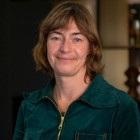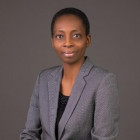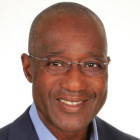Presentation Panel
Driving Digital Transformation: Real-world Success Stories in Education
Date Friday, Nov 24 Time – Room: Davos
Dive into this panel to explore firsthand accounts of triumphs and lessons learned in advancing digital transformation within higher education.
Discover a blended learning delivery model, strategies for teacher upskilling, and the integration of digital competencies into curricula. Delve into the role of Open Education and Open Pedagogy in fostering enriched learning experiences, while addressing leadership and change management challenges.
Join us to uncover actionable insights for successful digital evolution.

Marijn Post
Senior Advisor Learning and ICT, HAN university of applied sciences, Netherlands
Started working as a movement scientist and neurophysiologist I am at the moment working as an passionate advisor in Learning and ICT. The main topic of my interest are Digitale Learning materials and more specifically Open Digitale Learning materials and Open Education.
Links

Liandi Van den Berg
Professor, Director TELIT-SA research entity, North-West University, South Africa
Prof. Liandi van den Berg (PhD) is a Professor in the Faculty of Economic and Management Sciences at North-West University. She is the Director of the Technology Enhanced Learning and Innovative Education and Training in South Africa (TELIT-SA) research entity at NWU. Under her leadership, the TELIT-SA entity focuses on research-informed teaching and learning with technology and innovative provides training and development for effective technology integration and artefact development for teaching and learning. She is part of the NWU Business Digital Business Strategy core team, which drives the digital transformation process within the institution, and is the institutional project leader for digital assessment integration.

Monioluwa Omolara Olaniyi
Professor, National Open University of Nigeria, Niger
Monioluwa Omolara Olaniyi is a Professor of Nematology at the National Open University of Nigeria (NOUN). She was the pioneer Deputy Vice-Chancellor for Technology, Innovation and Research (DVC-TIR) in the university. As pioneer DVC-TIR, she coordinated the IT directorates through an IT committee to design the internet networking structure of the 114 study centres with the Headquarters. She identified through research, learner support needs for learners in ODeL institutions like NOUN and the technological support to enhance learners’ success. She also coordinated the IT team that built and maintained the university website. She demonstrated with data, the need for inclusiveness in the provision of technological resources and learning infrastructure for different categories of learners, especially the differently-abled learners, which led to the university developing a policy for inclusiveness of this category of learners. She facilitated the establishment of the e-ticketing system for resolution of learner’s queries resulting in the restructuring of units and development of the guiding rule for the timely resolution of learners’ complaint.
She was the first female Dean of the Faculty of Sciences of the university where she established the culture of applied research and enhanced the teaching of practical science in Open and Distance Learning in the institution. She also initiated the digital concept of science practicals for Biology, Chemistry and Physics programmes. As Dean she successfully moved official academic activities in her faculty online, in response to the prevailing lockdown resulting from the COVID-19 pandemic.
She is the Senior Management contact and project lead of the Partnership for Enhanced and Blended Learning (PEBL), West Africa project at the National Open University of Nigeria, a project funded by the Australian Department of Foreign Affairs and Trade, through the Association of Commonwealth University (ACU), UK for the capacity building of selected universities from Ghana and Nigeria in blended learning. In this project, NOUN has trained academics from the partner universities in Ghana and Nigeria in the use of the Learning Management Systems and Online Facilitation with cascade training of students by the institutions under the supervision of the NOUN PEBL-WA team.
Olaniyi serves as the Deputy Facilitator-General (Administration) of the Virtual Institute for Capacity Building in Higher Education (VICBHE), jointly supported by Nigeria’s National Universities Commission and the National Open University of Nigeria to develop the capacity of personnel in higher education regulatory institutions and in universities in Nigeria and across Africa. She is passionate about developing digital tools and learning models for the effective teaching of Science, Technology, Engineering and Mathematics (STEM) programmes in resource-limiting higher education institutions to enhance learner’s skills through technological interventions.
Monioluwa Olaniyi is a recipient of scholarship and fellowship awards for her academic training and has international research and travel grants to conferences to her credit. She has published her research results in international professional journals, books, and as technical reports. She believes in lifelong learning and updates herself through regular professional development training. Her philosophy is entrenched in inclusivity in capacity building for strategic development. She acquired training and expertise in the Management of Higher Education Institutions at the International Deans’ Course Africa coordinated by a consortium of the German Academic Exchange Service (DAAD), Centre for Higher Education (CHE) German Rector Conference, Alexander von Humboldt (AvH) Foundation, and the University of Osnabrück, Germany and has served as a resource person on the programme.
She earned a Bachelor of Technology degree from the Federal University of Technology, Akure and a Master of Science degree from the University of Ibadan, both in Nigeria. She also earned a Master’s degree from the University of Ghent (UG) and PhD degree from the Catholic University of Leuven, both in Belgium. She holds a Postgraduate Certificate in Biosafety of Plant Biotechnology from UG. In Information Technology (IT), she has CompTIA A+ certification and is an Oracle Certified SQL Expert. In response to the recent challenges of COVID-19, she upped her skill with training in “taking your teaching online” and “acquiring skills for 21st-century teaching and learning” both from the Open University, United Kingdom (UK). She earned with Distinction, the NOUN certificate for setting up and managing e-learning platform for quality education, a special quality assurance training (SQAT). She acquired a Certificate of participation in the course on Continuous Professional Development and enhanced her skills in instructional design and learning technology with the Harvard Teaching Certificate in Higher Education.
Links
Moderator

Bakary Diallo
Lecturer, University of Nova Gorica, Austria
Dr. Diallo’s primarily interest is in digital transformation in Higher Education. He has been working in the education sector as an executive manager, a thought leader, an academic, a researcher, and a secondary school teacher. He is currently teaching part-time at the University of Nova Gorica in Slovenia.
He was the Rector of the African Virtual University from 2007 to 2021, and a Board member the Open Education Global (OEG) from 2013 to 2017.
He holds a Ph.D in Educational Administration from the University of Ottawa, Canada. He received several awards including the 2017 the OEG Individual Leadership Prize, and the 2015 International Council for Distance Education Institutional Prize.
Links
Towards The Digital Transformation Vision: Re-skilling Lecturers and Changing Curricula, Liandi Van den Berg
This presentation aims to disseminate the Digital Transformation Strategy implemented within a higher education institution, highlighting the upskilling of lecturers and curricula changes to address industry needs.
Participants will learn about best practices, leadership, and change management in digital transformation, as well as engage with findings on upskilling and curricula changes.
Open Pedagogy: A Driving Force for Meaningful Learning, Marijn Post
This presentation explores the role of Open Education and Open Pedagogy in creating a more meaningful learning experience Meaningful learning focuses on a directly applicable learning experience with value for both the individual and the group and appeals to the motivation of the students themselves.
Marijn Post will focus on student-oriented learning, with examples of how Open Pedagogy contributes to meaningful learning and how it can be applied in the education process.
Technology-enhanced Learner Support Model for Capacity Building of Academics in the Use of the Learning Management System: A PEBL-WA project, Monioluwa Omolara Olaniyi
This presentation discusses a delivery model for blended learning that has been developed based on the experience of the National Open University of Nigeria as a Technical Partner in the Partnership for Enhanced Blended Learning West Africa project. The model aims to ensure 50% student success, compared to the current average of 20% for open and distance learning in Africa.
Monioluwa Omolara Olaniyi will explain the challenges of capacity building for digital transformation in higher education in West Africa. She will share a strategic learner support scheme, and showcase the effectiveness of cascade training for upskilling and reskilling teachers. Her inisighs will be useful for policymakers, industry, and researchers interested in advancing blended learning and open and distance learning.